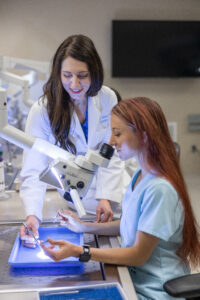On Sunday nights this summer you’ll find a small group of undergraduate students along with our Associate Residency Program Director, Dr. Carolyn Quinsey, virtually learning suture techniques live with feedback as part of UNC’s first virtual internship program for undergraduate students. Dr. Quinsey receives many shadowing requests from undergraduate students interested in neurosurgery research and clinical experience, so she decided to create a virtual internship just for them.
Residency Program Director, Dr. Carolyn Quinsey, virtually learning suture techniques live with feedback as part of UNC’s first virtual internship program for undergraduate students. Dr. Quinsey receives many shadowing requests from undergraduate students interested in neurosurgery research and clinical experience, so she decided to create a virtual internship just for them.
The idea came to Dr. Quinsey last summer, while she was leading a virtual sub-I for 4th year medical students. As a first generation college graduate, Dr. Quinsey acknowledges that she would not be a neurosurgeon today if not for shadowing opportunities and health care exposure at a young age. Dr. Quinsey wants to provide exposure to neurosurgery as well as unique learning opportunities for other students interested in pursuing careers in medicine.
To gauge interest and find participants, Dr. Quinsey posted about the internship on her social media accounts, and received an overwhelming response from students around the country. One of the many benefits of virtual learning is the ability to reach a larger and more diverse audience.

Each Sunday evening, Dr. Quinsey leads a virtual suturing lab for students. Each student uses surgical instruments to practice suturing on chicken breasts with a second camera set up so that their work can be seen. This allows Dr. Quinsey to give instruction and feedback to both medical students and undergraduate students participating in the virtual lab.
“As someone who is applying to medical school as we speak, the overall interview and professional advice has been incredibly helpful,”
In addition to suture nights, Dr. Quinsey prepares discussions focused on relevant workplace and healthcare topics for her students. This also provides a space for students to ask direct questions about working in medicine, applying to medical school, professionalism, interview skills, work/life balance, and more. During this time, UNC School of Medicine students also participate to answer questions and to give advice to undergraduate students applying to medical school. “As someone who is applying to medical school as we speak, the overall interview and professional advice has been incredibly helpful,” said Gabriella Hesse, a rising senior at the University of North Carolina Chapel Hill. “Through the internship I have also really come to appreciate the physicians as human.”
This internship has allowed Dr. Quinsey to connect with other students from similar backgrounds. Dr. Jeremiah Bonnet, a rising junior at New York University, is also a first-generation college student who has benefited greatly from the mentorship aspect of the program. “This experience has been transformative,” said Bonnet. “As an undergraduate student it has been overwhelming to try and keep up with all of the terminology and concepts presented during grand rounds, virtual clinical lab, and lectures, but I have learned by osmosis and slowly but surely broadened both my neurology and medicine/general professional development knowledge base. Dr. Quinsey has been super helpful, and having the opportunity to shadow under her wing has been a gift.”
 Local students are also invited to attend occasional resident skills labs, grand rounds, and shadow opportunities in clinic. Gabriella Hesse has been able to spend time on campus with Dr. Quinsey. “The most memorable part of this experience for me was the Stryker cadaver lab where we started off with a decompressive craniectomy and then just explored afterward,” said Hesse. “I loved the tangible experience of it.”
Local students are also invited to attend occasional resident skills labs, grand rounds, and shadow opportunities in clinic. Gabriella Hesse has been able to spend time on campus with Dr. Quinsey. “The most memorable part of this experience for me was the Stryker cadaver lab where we started off with a decompressive craniectomy and then just explored afterward,” said Hesse. “I loved the tangible experience of it.”
Part of the research component of the internship included interviews with patients post-op. With permission, students contact patients over the phone to ask about their care, and about their interactions with their physician and nursing staff. This allows students to hear about patient care from the patient’s perspective while also having the opportunity to share patient stories with the nursing staff who typically do not get to see these patients after discharge.
Dr. Quinsey’s passion for mentoring is evident to the undergraduate students that have worked with her this summer. “She takes the time to answer what I am sure are not the highest level questions and has supported me in my personal growth,” says Bonnet. “She is a phenomenal surgeon, mentor, and person.”
Despite the limitations that can come with a virtual format, students still greatly benefit from participating in virtual medical education, something that will be utilized even more by medical schools and residency programs in the future. “I have built a relationship with our internship crew,” said Bonnet. “We have shared laughs, had deep conversations, saved chicken lives, and have truly learned from one another. They have made this program a memorable one.”
UNC Neurosurgery and Dr. Quinsey are planning to open a virtual internship in the summer of 2022, with expanded medical student involvement and interactions with the undergraduate students. The Neurosurgery Interest Group at UNC will take a formal active role in this and other virtual events with the intention to broaden diversity in medicine and surgical subspecialties.
Call for applications will be on social media next April.